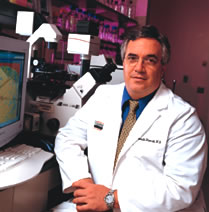|
|
| Pioneering Stem Cell Research |
| Last year, Miami Project researcher Pantelis Tsoulfas, M.D., and I contributed to a National Institutes of Health position paper, requested by Secretary of Health and Human Services Tommy Thompson to help President Bush define the potential losses associated with a proposed complete ban on pluripotent stem cell research. The President confronted this “difficult moral intersection” with a pledge to provide federal funds only for work carried out with existing cell lines, a purported 60-some colonies already housed at labs around the world. Initial relief was short-lived, however, as questions quickly arose among scientists regarding the quantity, quality, and accessibility of these lines.
With an exceptionally diverse and growing cadre of researchers, the University of Miami is a national and international leader in critically important cell therapy applications, such as pancreatic islet and bone marrow transplantation. In a unique interdisciplinary academic venture, more than 70 investigators from the School of Medicine and the College of Engineering are applying the principles of biology and engineering to develop viable alternatives for restoring, maintaining, or improving the function of human tissues and organs.
The University of Miami has all the necessary ingredients to make real inroads in stem cell research and to bring the fruits of cellular therapies and tissue and organ engineering to millions who need it. |
|
|
| Camillo Ricordi, M.D., is the Stacy Joy Goodman Professor of Surgery at the University of Miami School of Medicine and the scientific director of the Diabetes Research Institute. As codirector of the new Executive Office of Research Leadership, Dr. Ricordi helps formulate and implement the school’s overall research agenda. |
|
|
| Photography: Donna Victor |
|
|
|
|
|
|
|
UM MEDICINE HOME | UM MEDICINE ARCHIVE |
|
|
 Nonetheless,
work with stem cells has progressed here and abroad. Investigators in
the United States fall into two distinct groups: those working in centers
with substantive federal funding but relatively limited stem cell access,
and those affiliated with centers that push ahead without relying on
federal funds. In other, less restrictive countries, stem cell research
is moving full throttle with many promising developments from laboratories
in Sweden, Israel, the United Kingdom, Japan, and Spain.
Nonetheless,
work with stem cells has progressed here and abroad. Investigators in
the United States fall into two distinct groups: those working in centers
with substantive federal funding but relatively limited stem cell access,
and those affiliated with centers that push ahead without relying on
federal funds. In other, less restrictive countries, stem cell research
is moving full throttle with many promising developments from laboratories
in Sweden, Israel, the United Kingdom, Japan, and Spain. Several
developments needed to capitalize on existing strengths and continue
our pioneering role in this burgeoning branch of biomedical research
already are under way. Critical infrastructure, such as cellular imaging
laboratories and human cell processing facilities, must be created or
expanded and shared in a cost-efficient manner throughout centers and
departments. We also must recruit key faculty and maximize our research
strengths while forging new strategic cellular therapy and stem cell
alliances, as other research powerhouses are doing. Some of the best
investments we can make are to nurture our own rising stars in biomedical
research.
Several
developments needed to capitalize on existing strengths and continue
our pioneering role in this burgeoning branch of biomedical research
already are under way. Critical infrastructure, such as cellular imaging
laboratories and human cell processing facilities, must be created or
expanded and shared in a cost-efficient manner throughout centers and
departments. We also must recruit key faculty and maximize our research
strengths while forging new strategic cellular therapy and stem cell
alliances, as other research powerhouses are doing. Some of the best
investments we can make are to nurture our own rising stars in biomedical
research.